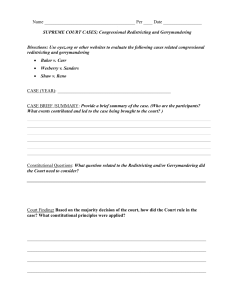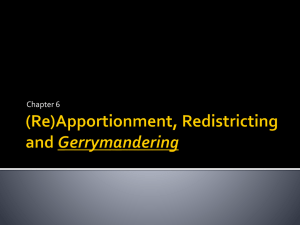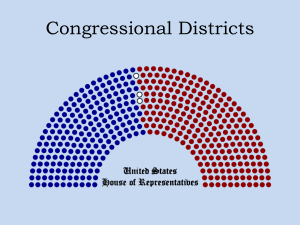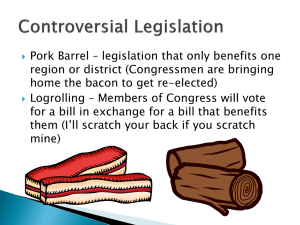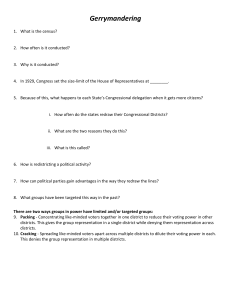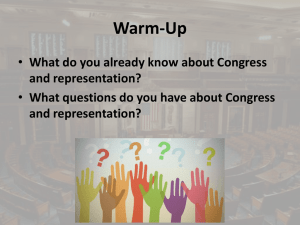Gerrymandering - Cloudfront.net
advertisement
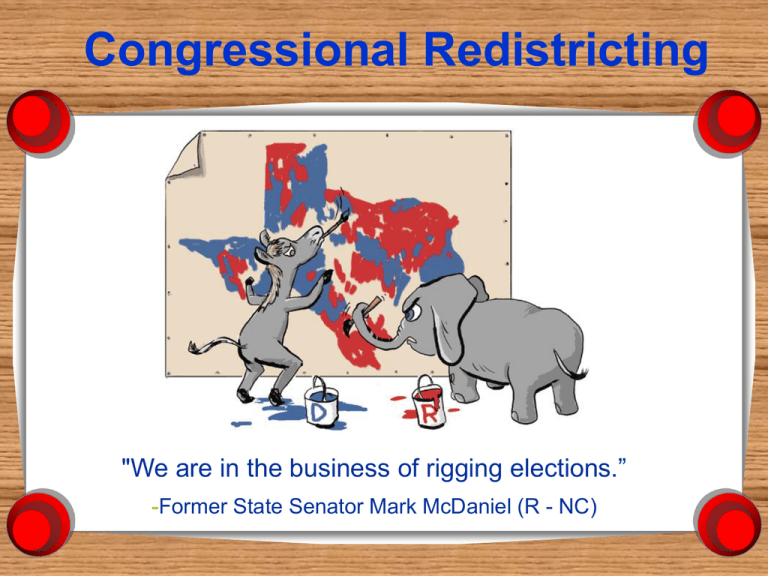
Congressional Redistricting "We are in the business of rigging elections.” -Former State Senator Mark McDaniel (R - NC) Step 1: Reapportionment There are 435 members in the House of Representatives. After each census, the number of representatives are distributed among the states based on population. Step 2: Redistricting State legislatures draw up congressional districts for their state, • One district for each representative. • Ex. After the 2000 census, CA was apportioned 53 seats in the House of Reps. • Therefore, there are 53 congressional districts in CA. MAP Principles of Redistricting Equal Population - Each district should contain roughly the same number of people (approx. 650,000 per district) • One Person, One Vote Contiguity - Each district should be one continuous shape. • No "land islands" are allowed. Compactness - Districts should be drawn in compact shapes. • Extremely jagged edges and skinny extensions are hallmarks of gerrymandered districts. What is Gerrymandering? Gerrymandering: The manipulation of electoral boundaries to give one group an advantage over another. • Named after the governor of MA, Elbridge Gerry Types of Gerrymandering Partisan Gerrymander: When the majority party draws the district lines to maximize the power of their own party. Racial Gerrymander: When districts are drawn to either minimize or maximize the power of minority voters Gerrymandering Techniques Cracking - Spreading like-minded voters apart across multiple districts to dilute their voting power in each. Packing - Concentrating like-minded voters together in one district to reduce their voting power in other districts. Gerrymandering Techniques Hijacking: Separating an incumbent candidate from his constituents and placing him/her in a district where he/she has no name recognition. Kidnapping: Drawing two incumbent candidates into the same district so they must run against each other. Gerrymandering in CA Gerrymandering in NC (1992) Gerrymandering in NY Gerrymandering in TX The Effects of Gerrymandering "Here is a telling statistic: 153 of California's congressional and legislative seats were up in the last election and not one changed parties. What kind of democracy is that?” Governor Arnold Schwargenegger, 2005 State of the State Address Effects of Gerrymandering "It used to be that the idea was, once every two years voters elected their representatives, and now, instead, it's every ten years the representatives choose their constituents.” - Pamela Karlan, Professor of Public Interest Law at Stanford Law School Think About It!!! What effect does gerrymandering have on the democratic process? • Can we really claim to be a democracy when this is allowed to happen? How can we prevent this abuse of power? What are the implications for the next census? Extra Credit Opportunity Visit: • www.redistrictinggame.org Play the Redistricting Game • Accomplish your mission and print out evidence for 10 extra credit points!
